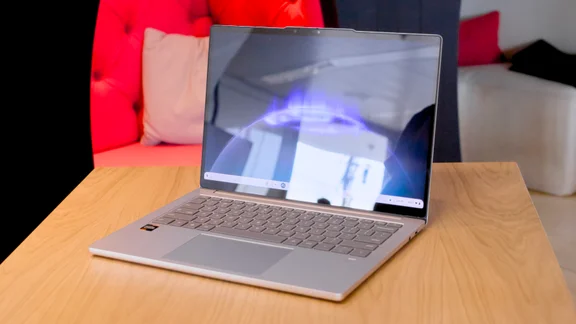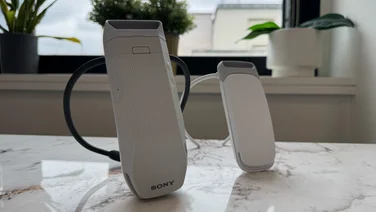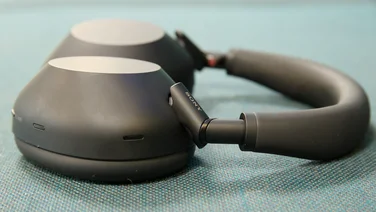News

Still no new Google Pixelbook but this is as close as it gets
Latest Chromebook has echos of the Pixelbook Go in its design, but it’s the ARM chip at the laptop’s heart that steals the show
-
 When is Amazon Prime Day? Everything you need to know Everything you need to know about the next edition of the Amazon Prime Day deals event
When is Amazon Prime Day? Everything you need to know Everything you need to know about the next edition of the Amazon Prime Day deals event -
 XGIMI MoGo 4 hands-on: XGIMI’s portable projector gains major improvements XGIMI unveils the latest model in its portable projector range and it's a little bit special
XGIMI MoGo 4 hands-on: XGIMI’s portable projector gains major improvements XGIMI unveils the latest model in its portable projector range and it's a little bit special -
recommended
 Nintendo Switch 2 review: It’s a super-sized smash, bro The long-awaited Nintendo Switch 2 evolves the formula with more powerful hardware and a much better display – but battery life suffers£395
Nintendo Switch 2 review: It’s a super-sized smash, bro The long-awaited Nintendo Switch 2 evolves the formula with more powerful hardware and a much better display – but battery life suffers£395 -
 The best and worst announcements from Apple’s WWDC 2025 WWDC 2025 goes hard on the software, with Apple revealing its new year-based naming system and fresh designs for iOS 26 and co
The best and worst announcements from Apple’s WWDC 2025 WWDC 2025 goes hard on the software, with Apple revealing its new year-based naming system and fresh designs for iOS 26 and co -
 7 common mistakes people make when buying security cameras Thinking of kitting out your home with security cameras? It's a great idea but there are plenty of things to think about before parting with your cash
7 common mistakes people make when buying security cameras Thinking of kitting out your home with security cameras? It's a great idea but there are plenty of things to think about before parting with your cash -
 6 mistakes people make when choosing a new power bank Don't get overcharged – and other pitfalls to avoid when buying your next power bank
6 mistakes people make when choosing a new power bank Don't get overcharged – and other pitfalls to avoid when buying your next power bank -
 I tried Sony’s latest Reon Pocket Pro It has twice the cooling area and twice the operating time, but is the Sony Reon Pocket Pro twice as conspicuous as its predecessor?
I tried Sony’s latest Reon Pocket Pro It has twice the cooling area and twice the operating time, but is the Sony Reon Pocket Pro twice as conspicuous as its predecessor? -
best buy
 Sony WH-1000XM6: A new standard for headphones Sony updates its flagship headphones and improves them across the board – the WH-1000XM6 are the new king of noise-cancelling headphones£399
Sony WH-1000XM6: A new standard for headphones Sony updates its flagship headphones and improves them across the board – the WH-1000XM6 are the new king of noise-cancelling headphones£399 -
 Samsung Galaxy S25 Edge preview: The real Slim Shady The super skinny Samsung Galaxy S25 Edge looks to be an impressive feat of engineering – but I’m not convinced the concessions are worth it
Samsung Galaxy S25 Edge preview: The real Slim Shady The super skinny Samsung Galaxy S25 Edge looks to be an impressive feat of engineering – but I’m not convinced the concessions are worth it -
 Shark's crazy new TurboBlade fan The Shark TurboBlade could revolutionise how you think about fans in your home
Shark's crazy new TurboBlade fan The Shark TurboBlade could revolutionise how you think about fans in your home -
 Henry vacuum range expands with two new XL additions The Henry Home XL and XL Xtra promise larger capacities and a wider range of tools and accessories
Henry vacuum range expands with two new XL additions The Henry Home XL and XL Xtra promise larger capacities and a wider range of tools and accessories -
 Samsung unveils bonkers new Bespoke Jet AI Ultra vacuum cleaner The Bespoke AI Jet Ultra can alert you to phone calls and switch off automatically, but promises to offer more than just gimmicks
Samsung unveils bonkers new Bespoke Jet AI Ultra vacuum cleaner The Bespoke AI Jet Ultra can alert you to phone calls and switch off automatically, but promises to offer more than just gimmicks -
 Expert Reviews Sleep Awards 2025 The best brands voted for by you, plus our favourite tried-and-tested products to invest in
Expert Reviews Sleep Awards 2025 The best brands voted for by you, plus our favourite tried-and-tested products to invest in